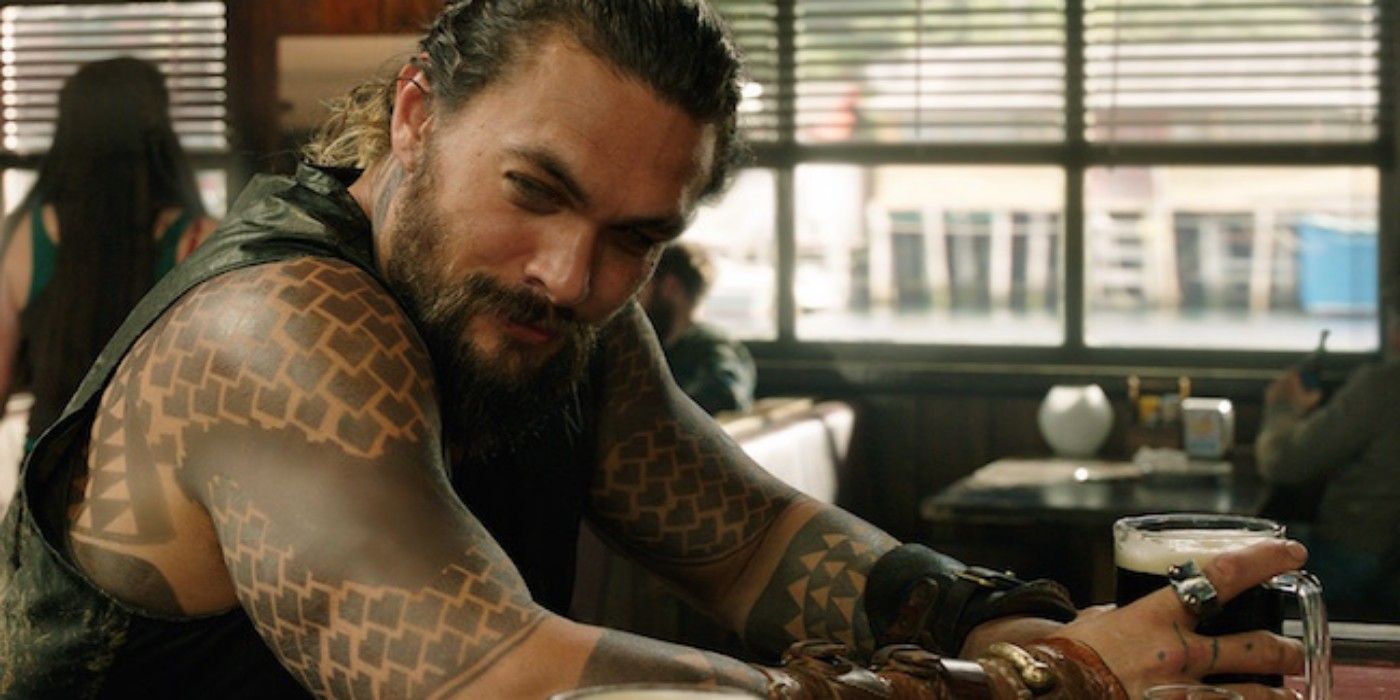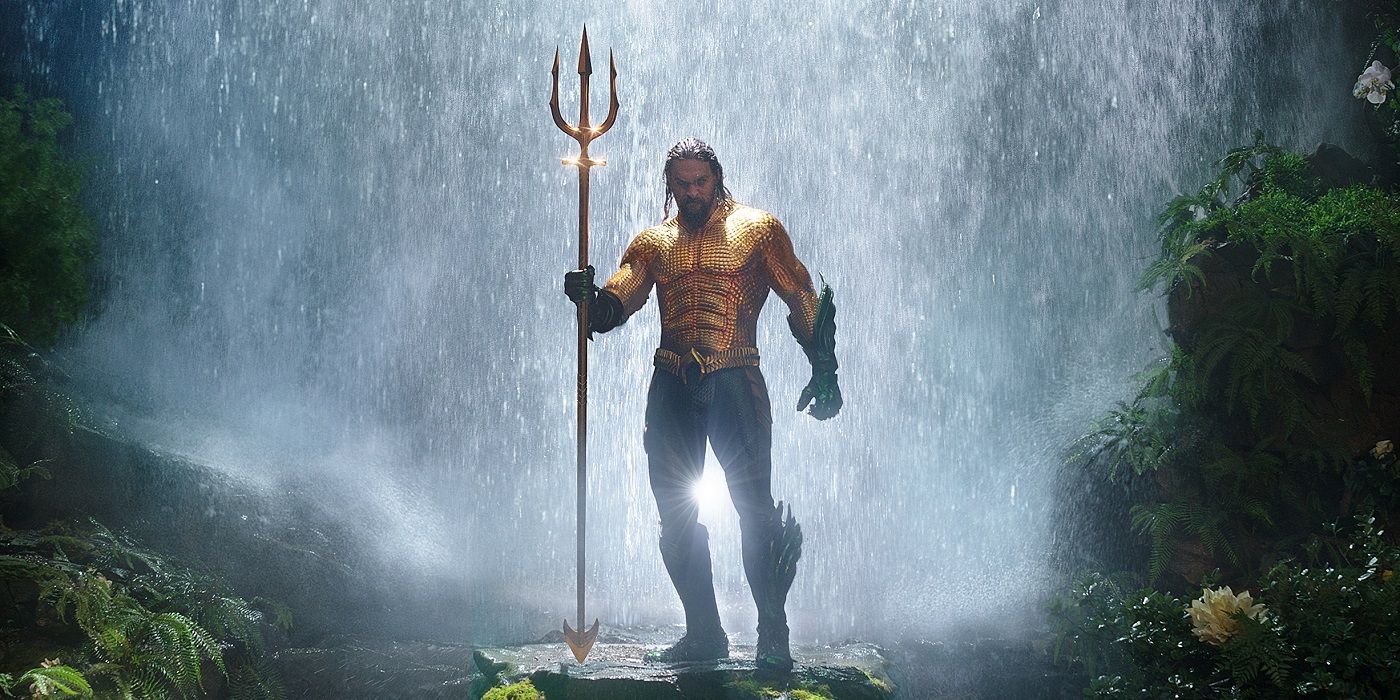A little over a month since its theatrical debut, James Wan's Aquaman has cemented its status as a worldwide, unequivocal success. The first film in the DC Extended Universe to earn over $1 billion at the global box office, this past weekend saw the superhero film surpass the lifetime earnings of 2012's The Dark Knight Rises to become the highest earning DC Comics adaptation of all time. Providing a much-needed win for Warner Bros.' beleaguered DCEU, Aquaman's runaway success with audiences was by no means a guarantee, especially considering the reputation of its eponymous superhero before the film's opening.
For the past several decades, the underwater DC Comics superhero had been written off by the general public as a joke; a woefully out-of-place character amongst the DC Universe's greatest heroes on the Justice League. Dismissed for his alleged ineffectiveness out of water and his seemingly useless ability to communicate with sea life, the character has been fighting a stigma that began as early as 1967's animated series, Superman/Aquaman Hour of Adventure and 1973's Super Friends, which reduced his character to only be useful in limited situations, accentuated by the familiar telepathic noise used by the character to let fish handle the hard work for him.
RELATED: Justice League Concept Art Reveals Original Design for Vulko
Following his two animated appearances, which served as a dubious first impression to the general public, Arthur Curry had become something of a pop culture punchline, often the butt of superhero-themed jokes on late night television. This included the character being parodied in a 1992 skit on Saturday Night Live, attending Superman's funeral to tie-in with the landmark Death of Superman storyline in the comics with David Spade as Aquaman; a running joke character on Adult Swim's stop-motion comedy series Robot Chicken; the subject of an animated spoof on Fox's variety show Mad TV; a recurring bit on The Late Late Show with Craig Ferguson; and, of course, a longstanding joke across multiple seasons of the HBO series Entourage, selected by series creator Doug Ellin largely because of the sheer ridiculousness of the character.
RELATED: Aquaman Hides a Conjuring Easter Egg (and It's NOT King Orm)
Hindsight being 20/20, the HBO series' joking predictions that an Aquaman film would go on to become one of the biggest movies of all time were surprisingly prescient. The real film has already earned over $300 million at the domestic box office alone, outperforming the domestic engagements of Ant-Man and the Wasp, Venom and Spider-Man: Into the Spider-Verse, not to mention every other film from Warner Bros.' formerly struggling shared cinematic universe. But how, exactly, did a superhero that languished for years become the DCEU's unlikely biggest hit, vastly outperforming its more iconic counterparts including Batman v. Superman: Dawn of Justice and Justice League?
NEXT PAGE: Aquaman's Retribution Began in the Comics Before Becoming a Big Screen Phenomenon
Following DC Comics' relaunch of its publishing line in 2011 (an initiative dubbed the New 52), writer Geoff Johns and artist Ivan Reis took over Aquaman's ongoing series and sought to restore the character's sense of legitimacy and worthiness within the DC Universe. Much of the creative team's first arc leaned into the preconception that the character was a bit of a joke compared to the rest of the Justice League, with civilians dismissing Arthur before he triumphantly reminds the world of why he's one of the DCU's premier superheroes. This arc was immediately followed up by a crossover with the main Justice League ongoing series; having firmly reestablished the superhero within the DCU, Johns and Reis then made the character an integral part of DC's most enduring ensemble title.
RELATED: Aquaman: Wan Worked With Snyder to Undo Whedon's Justice League Changes
The New 52 comic book run is a clear influence on Wan's solo film, with Johns even serving as a co-writer on the movie's screenplay. Filmmaker Zack Snyder had already introduced Jason Momoa's incarnation of the character to the DCEU in Batman v Superman, but replacement director Joss Whedon leaned more heavily into the jokier aspects of the character during Justice League reshoots, despite protests from Momoa himself. As such, while Aquaman featured a more light-hearted tone than its DCEU predecessors, the jokes in the film are not so much about the quality of the superhero and at Arthur's expense but rather about the ridiculousness of the overarching world itself.
Following the lukewarm reception to Batman v Superman and Justice League, Wan employed a much brighter, more colorful visual design for Aquaman than the dark, muted color palettes of the previous films. The marketing for the film wisely showcased this lighter tone and more effervescent visual design from the film's first trailer and promotional materials, revealing to audiences that the undersea hero's solo film would be markedly different than what came before. The film's cheeky sense of humor would later carry over into the wider marketing for the film, buoyed by an unfailingly enthusiastic Momoa.
RELATED: Justice League Concept Art Reveals Original Aquaman Armor Design
To better position itself internationally, the film opened in China weeks earlier than North America, where it quickly became a box office success. The film received a rare theatrical extension from the Chinese government to play in cinemas for an additional month, ultimately becoming the highest earning Warner Bros. film released in the country, and second only to Avengers: Infinity War as the highest earning Hollywood film released in China last year, earning $294.8 million in the country.
To build an early positive word-of-mouth in the United States, Amazon Prime members were given access to early screenings of the film, nearly a full week before Aquaman's wide release domestically. The strategy payed off, with demand leading to the studio adding an additional 100 screens to the advance showings which gave the film an early domestic box office boost. The advance screenings didn't prematurely throw off the film's momentum, and despite opening against Disney's Mary Poppins Returns and Paramount's Bumblebee, the DCEU movie easily won the Christmas opening weekend, earning over $100 million domestically across the five-day period with its momentum leading it to top the domestic box office for three weekends in a row.
RELATED: Aquaman Director James Wan Reacts to Film's $1 Billion Box Office Success
While 2017's Wonder Woman had served as a course correction of sorts, the lackluster box office and critical response to the following year's Justice League left the DCEU in dire straits. Aquaman's unprecedented success came as a much-needed victory, leading the studio not only to approach Wan to direct a sequel but also for the studio to rethink its entire strategy regarding the future of the DCEU. The underwater superhero not only saved the day on the big screen, but behind-the-scenes, may have saved DC Films. Not bad for a character that was written off by many as the perennial joke of the DC Universe.
Directed by James Wan, Aquaman stars Jason Momoa as Aquaman, Amber Heard as Mera, Patrick Wilson as Ocean Master, Willem Dafoe as Nuidis Vulko, Yahya Abdul-Mateen II as Black Manta, Temuera Morrison as Thomas Curry, Dolph Lundgren as Nereus and Nicole Kidman as Queen Atlanna.


